
The Lord’s Resistance Army Disarmament and Northern Uganda Recovery Act of 2009 was the most widely supported Africa-specific U.S. legislation in recent history. It aims to eliminate the threat posed by a rebel group that has devastated central Africa for more than 20 years: killing and maiming civilians, abducting children and forcing them to fight or serve as sex slaves or “wives,” and looting villages. As required by the legislation, President Obama developed a strategy for ending the threat posed by the Lord’s Resistance Army, or LRA, and submitted it to Congress last November.
One of the central components of the strategy—and a critical task in addressing the LRA—is to promote the escape, disarmament, and reintegration of its fighters, many of whom have been abducted and forced to fight for the group.
In a paper released today by the Enough Project, Field Researcher Ledio Cakaj examines the challenges related to promoting the escape, disarmament, and reintegration of LRA fighters and presents several recommendations. Based on interviews with former LRA combatants, the report provides insight into why fighters leave the ranks, the risks and challenges they face in doing so, and the ways in which the government of Uganda and the international community can encourage defections.
LRA fighters attempting to leave the rebellion face several risks and challenges, Cakaj found. First, fighters trying to escape will be beaten or killed if caught by LRA commanders. Once outside of the reach of their commanders, former LRA risk being lynched by the local populations of the Democratic Republic of Congo, Sudan, and the Central African Republic as well as being mistreated by the regional armies. Although an amnesty law exists in Uganda that requires the government to grant amnesty to former LRA combatants, it has refused during the past year to grant amnesty certificates and provide reintegration packages. The Ugandan army often holds the former LRA it captures in custody for several months and coerces them to join the army with no training and no salary. Finally, former members of the LRA are uncertain about how they will be received upon returning home. As Cakaj reports, “‘I was forced to kill my neighbors in front of everyone else,’ said a former fighter who had been with the LRA for 13 years. ‘How can I go back?’”
Disillusioned by his recent experiences in the LRA, one former combatant who escaped in Sudan said: “Kony lied to us when he said we were fighting for the rights of our people in Uganda. We were too far from home.” Facing forced recruitment in the army, fearing retribution from community members they were forced to attack when in the LRA, and lacking economic opportunities, people formerly with the LRA remain “far from home” even when they are physically in Uganda.
The report makes several recommendations to support the defection of LRA fighters. It outlines key initiatives the Ugandan government should undertake in order to make return more appealing. Among these are ceasing to manipulate former fighters into joining the Ugandan forces, reinstituting the distribution of certificates of amnesty and reintegration packages, and developing a demobilization strategy.
A previous Enough report, “The Lord’s Resistance Army of Today,” showed that the LRA appears disorganized and lacking a centralized command, and that the number of fighters in the LRA is dwindling. Currently, only about 400 fighters remain, Cakaj reported in November. Given the disorganization, fragmentation, and depletion of the LRA, this is a critical time to permanently eliminate the threat it poses and restore peace and security to the people of central Africa.
Photo: LRA fighter sits in tall grass (AP)

